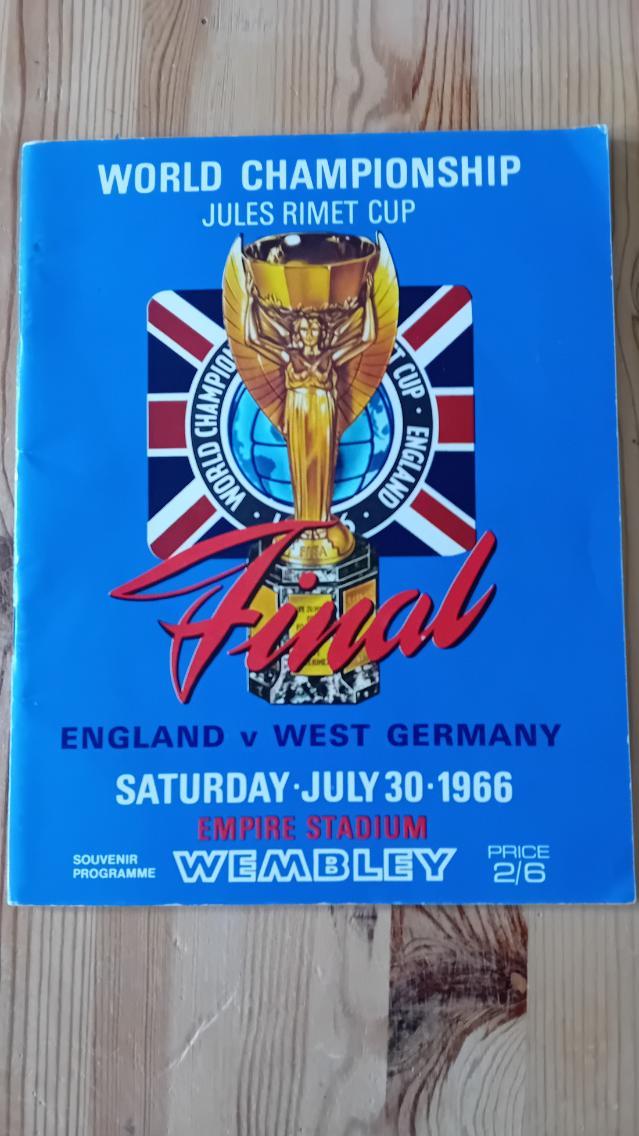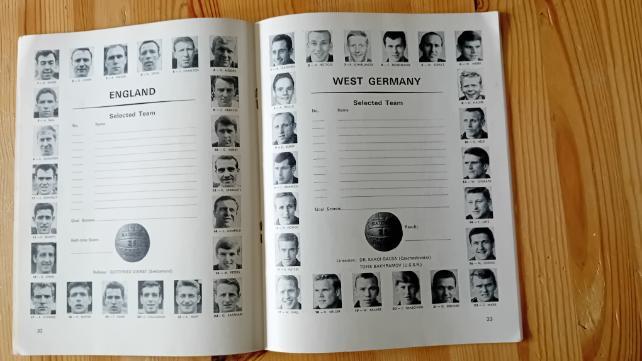Military Service, Football and the England 1966 World Cup Winners – Jack Charlton
23/06/2025 - 5.35
Alex Alexandrou
Recently, I was fortunate enough to acquire a match programme for the 1966 FIFA World Cup Final played between England and West Germany, played at Wembley, London, which England won 4-2 after extra-time.

1966 FIFA World Cup Final Match Programme. Source: Author's Collection
Looking through the programme, whilst there is a lot of interesting information about the tournament and how each team progressed to the final, there is virtually no information about the management, coaches and players of either team apart from their names, squad numbers and individual photos of them. Maybe to be expected, as most match programmes of the time rarely went presented in-depth profiles of managers, coaches and players.

1966 FIFA World Cup Final Match Programme Team Information. Source: Author's Collection
However, I would like to redress this in relation to the England squad, in the first in an occasional series of short articles, that highlights aspects of their football careers and military service either in terms of National Service or serving in World War Two.
This article will highlight snippets of Jack Charlton’s National Service as told through his own words in his autobiography published in 1996 and simply entitled: Jack Charlton – The Autobiography.
_(cropped)-(1).jpg)
Jack Charlton. Source: Panini, Public domain, via Wikimedia Commons
Jack Charlton spent his entire professional playing career with Leeds United. At the end of the 1952-53 season, he made his debut for the first team against Doncaster Rovers in the last league match of the season, which ended in a 1-1 draw. It would mark the beginning of the central defender’s long and distinguished career, that would last twenty years with his final appearance coming at the end of the 1972-73 season. He made 629 league appearances, scoring an impressive 70 goals and in all competitions, he made 762 appearances scoring 95 goals. He won the Football League Second Division (now known as the EFL Championship), Football League First Division (now known as the Premier League), FA Cup, League Cup, Charity Shield (now known as the Community Shield) and Inter-Cities Fairs Cup (which became the UEFA Cup and is now known as the Europa League) twice.
For England, between 1965-1970, he made 35 appearances, scoring 6 goals. It is fair to say that he came late to the party in international terms, as he made his debut against Scotland in 1965, in a 2-2 draw and became a mainstay of the England defence for the rest of the decade. In that time, he won the British Home Championship four times, was a member of the bronze medal winning England squad at the 1968 UEFA European Championships but did not play, was an integral member of the 1966 FIFA World Cup gold medal winning team and was a member of the England squad for the 1970 Mexico FIFA World Cup, where he made his 35th and final appearance for the national team in the 1-0 group stage victory over Czechoslovakia.
An impressive professional playing career for club and country. However, Jack Charlton’s fledgling club career was put on hold between 1953 and 1955, when he was called up for National Service, playing only once for the Leeds United first team during those two seasons but making numerous appearances for the reserves.
As he explained in his autobiography:
“…Depending on where you were stationed, it was possible for players doing National Service to fit in the odd game, but in my case there was an obvious problem in getting from Windsor to Leeds. You needed a forty-eight-hour pass to get home to play, and normally you only got one a month. But inevitably, I devised a system where I was able to swap around and make it back every fortnight. In my second year in the army I even managed to squeeze another first-team appearance for Leeds, against Lincoln City. But mainly I played in the reserves. Sometimes I think I wasted two years in the army while I could have been becoming a better player. But really I had as much football as I could handle.”
This is an interesting observation, as it was not unusual for professional footballers to have played 100 matches plus per season during their National Service. In some cases, this would include playing Army representative football at a number of different levels including international matches; playing for their professional club and in some cases representing their national team.
Following sixteen weeks initial training, Jack Charlton joined the Royal Horse Guards Regiment. To say his military service got off to an inauspicious start would be an understatement, as when he reported for his first tour of duty at Windsor Castle, he was in his own words “…put in the ‘clink’ for seven or eight hours for supposedly going absent without leave – and take it from me, it wasn’t a pretty experience.” It transpired that he should have initially gone to Catterick to play representative football for the Northern Command team but the message did not reach him!
However, this did not deter him and he explained in his autobiography that his National Service were two of his happiest years. He felt he had more freedom in the Army then as an apprentice at Leeds United, so long as he didn’t get caught!
At the time of Jack Charlton’s National Service, his Regiment did not go on foreign tours, unlike the Life Guards who were having an interesting time to say the least in Cyprus during the independence struggle on the island during the late 1950s.
However, he did have an opportunity to travel overseas, as he was quickly appointed as the captain of the Horse Guards football team, becoming the first private to have the honour of holding this position. It quickly transpired that he and his fellow teammates made up of mostly non-professional players with a smattering of professional players, where granted privileges that in effect allowed them to train as a professional team would. In turn, Jack Charlton and his team repaid this faith in them, as on the first foray abroad in what was then West Germany, they duly won the Cavalry Cup in Hanover. As he reminisced in “…army terms, that was like winning the FA Cup. I remember they flew out plane-loads of soldiers to support us against the teams out there.”
Jack Charlton gave an interesting insight into the relationship and payment system in place at Leeds United and other clubs for players who were undertaking National Service. As he explained:
“Lads in the army got four pounds a week retainer from their clubs. At Leeds, the rule was that you were paid six pounds when you came home on leave to play. It didn’t matter whether you were in the first or second team, the fee was the same.”
He went on to demonstrate his canny and strategic thinking, when he describes how he played the National Service and Club expenses system to his benefit as follows:
“…The real ‘scam’ came in the expenses. People doing their National Service got chits to travel back to their families. But in the case of lads based at Windsor and living in London, there were pretty useless.
I soon discovered that I could buy them for a few bob, use them to get to Leeds to play games, and then claim four or five pounds travel expenses from the club. The weekly wage in the army was something like twenty-five shillings, but thanks to my football, I was making between twenty-five and thirty pounds a month. And every now and then, I’d receive a parcel from my mother, with maybe a cake or something and a ten-bob note inside. In time, I got a reputation as a lad with a few quid to spare, and I became a moneylender. That, too, yielded a small profit, and by the time my service finished, I was doing nicely, with around four hundred pounds in the bank.”
This astuteness would hold him in good stead during his managerial career, where at club level between 1973 and 1985, he managed Middlesbrough twice (once as short-term caretaker manager) winning the Football League Second Division title and the Anglo-Scottish Cup, during his first stint; Sheffield Wednesday, gaining promotion from the Football League Third Division to the Football League Second Division; and Newcastle United.
However, it would be at international level that Jack Charlton’s reputation as a renowned manger would be cemented. He was appointed as the first Englishman to manage the Republic of Ireland and would go on to have notable success between 1986 to 1996. At the beginning of his tenure, the Republic won its first competition by winning the Iceland Triangular Tournament by overcoming the host nation and Czechoslovakia.
During his tenure, the Republic of Ireland qualified for the UEFA European Championship tournaments in 1988 and 1992, bowing out at the group stage on both occasions and the 1990 and 1994 FIFA World Cup tournaments, bowing out to the host nation, Italy at the quarter-final stage in 1990 and the Round of 16 in 1994.
For his footballing achievements he was awarded an Officer of the Order of the British Empire (OBE); appointed Deputy Lieutenant of Northumberland; inducted into the English Football Hall of Fame; awarded Honorary Irish Citizenship; became a Freeman of the City of Dublin; awarded an Honorary Degree of Doctor of Science by the University of Limerick; and presented the Presidential Distinguished Service Award for the Irish Abroad (posthumously).
Jack Charlton held strong socialist beliefs and if he felt there was a cause fighting for, he would wholeheartedly support it, including becoming a founding member and sponsor of the Anti-Nazi League and supporting striking miners during the 1984-85 Miners’ Strike.
You can find the antecedents of fighting spirit both on and off the pitch when he described how National Service shaped him as follows:
“…it’s amazing how two years in the army can change the way you see things. For the first time in my life, I had been living on my own, making all of my own decisions and generally living an adult way of life…
…I came back to Leeds two years older and much more self-assured. You could say I went away to the army a boy of eighteen, and came back a man of twenty.”
Jack Charlton passed away in 2020 at the age of 85. It is fair to say that he left an indelible imprint on the footballing stage at both national and international level, shaped in part by his National Service.
Biography
Alex Alexandrou is the Co-Founder and Chair of the Football and War Network


/prod01/wlvacuk/media/departments/digital-content-and-communications/submitted-news-images/Smelting-knife.png)
/prod01/wlvacuk/media/departments/digital-content-and-communications/images-2024/250630-SciFest-1-group-photo-resized-800x450.png)
/prod01/wlvacuk/media/departments/digital-content-and-communications/submitted-news-images/Way-youth-zone-August.JPG)
/prod01/wlvacuk/media/departments/digital-content-and-communications/images-2024/Arthi-Arunasalam-teaser.jpg)
/prod01/wlvacuk/media/departments/digital-content-and-communications/submitted-news-images/Muslim-woman-playing-football.jpg)
/prod01/wlvacuk/media/departments/digital-content-and-communications/submitted-news-images/Business-School-800x450.jpg)
/prod01/wlvacuk/media/departments/digital-content-and-communications/submitted-news-images/University-of-the-Year.jpg)